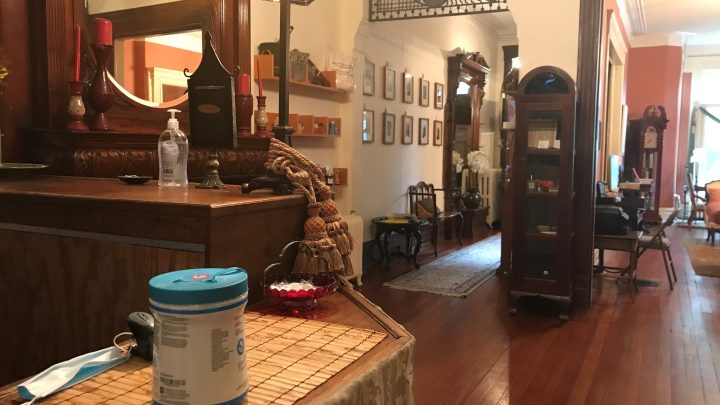
How the pandemic is creating a “low-touch” economy
How the pandemic is creating a “low-touch” economy

COVID-19 cases are on the rise, and communities that were on a path to reopening their economy are now facing renewed shutdowns and restrictions. For those businesses that can remain open, they are experimenting and adapting their operations to respond to the needs of the socially distant and “low-touch economy” of the pandemic.
For some companies, that means contactless deliveries to customers or having employees work remotely. The first thing that had to change at the Akwaaba D.C. bed and breakfast to adapt to the low-touch economy was the welcome ritual, said owner Monique Greenwood.
“We’re accustomed to hugging people, you know,” she said of visitors to the Victorian-era townhouse in Washington, D.C.’s Dupont Circle. “When guests walk in, we greet them with a warm hug and it’s all love, and now to have to be at a distance is difficult.”

She’s made other changes to adapt to the times. On-site staff regularly wipe down surfaces, keeping an eye on guest movement to see what gets touched. Communal hors d’oeuvres and dinners in the formal dining room have been replaced by in-room dining and snack baskets. Extra towels and sheets are placed in the eight literary-themed bedrooms at the beginning of the stay to limit anyone entering a room to clean.

But the lack of touch can have broader business implications, according to Andrea Luangrath, who teaches marketing at Iowa University’s Tippie College of Business.
“In business, [touch] really helps foster relationships. So even if you’re just engaging in a handshake or in kind of unobtrusive touches, like on the upper arm, this fosters connection with other people,” she said.
Luangrath said research supports the idea that touch can help boost the bottom line as well.
“So if a service provider touches a customer, we know things like they are more likely to buy your products, they’re more likely to just sample and try your products.”
The pandemic is forcing touch-dependent businesses to adapt, said Jennifer Tsitsopoulos with the Board of Innovation, a consulting firm advising companies on the transition.
“The service sector has been one that has moved the quickest,” said Tsitsopoulos, “mostly because those have been smaller, more nimble businesses who have been able to pivot and come up with creative solutions, because they’ve needed to.”
Restaurants have adjusted their layouts and hair salons are implementing staggered scheduling. Akwaaba D.C. owner Monique Greenwood runs four other inns along the East Coast, all pretty small with few staff on site.
“And we do think that that gives us an advantage, because there’s not a lot of people in and out of the lobby where they have to worry about their ability to social distance,” she said.
That was the lure for actress and producer Sheryl Lee Ralph, one of the recent guests at Akwaaba D.C. She was in the city working on her next directing project and was sharing the eight-bedroom inn with just one other guest and the innkeeper.
“I chose this space, and it was the right space for me because I’m not around a whole lot of people,” said Ralph, “and whether I can control it or not, I feel as if I have a bit of control of my surroundings.”
Tsitsopoulos at the Board of Innovation said more businesses will have to shift to “boutique” or exclusive experiences, targeting the customers willing to pay for that control over their surroundings even after the pandemic ends.
“So if you have the money, you can book out the whole salon for yourself and have this still high touch in a low-touch economy experience,” she said. The trend could extend to other businesses that usually encourage crowds, like movie theaters. “Being able to have these smaller pod rooms where you can book out the entire cinema for you with your closest friends or family to still enjoy that night out, but be confined to a smaller group setting.”
But that’s if someone has the money to pay for these kinds of experiences. With tens of millions of people out of work and services getting more expensive as businesses adapt to the risk of COVID-19, Tsitsopoulos said this pandemic may push the haves and have nots of this economy even further apart.
There’s a lot happening in the world. Through it all, Marketplace is here for you.
You rely on Marketplace to break down the world’s events and tell you how it affects you in a fact-based, approachable way. We rely on your financial support to keep making that possible.
Your donation today powers the independent journalism that you rely on. For just $5/month, you can help sustain Marketplace so we can keep reporting on the things that matter to you.












